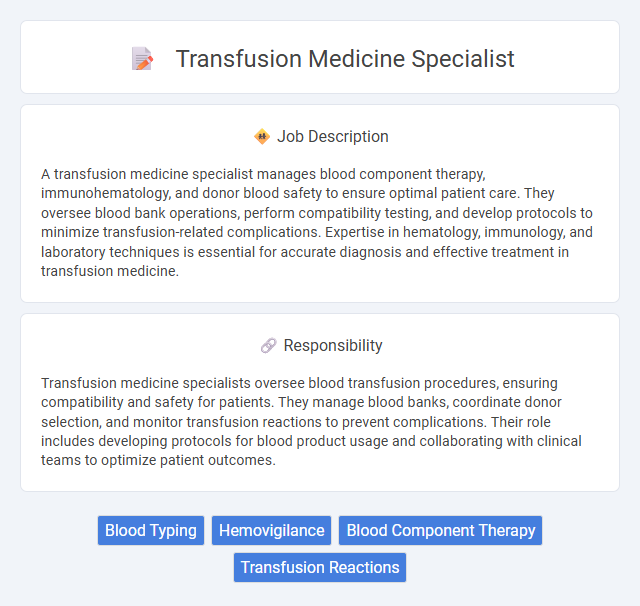
A transfusion medicine specialist manages blood component therapy, immunohematology, and donor blood safety to ensure optimal patient care. They oversee blood bank operations, perform compatibility testing, and develop protocols to minimize transfusion-related complications. Expertise in hematology, immunology, and laboratory techniques is essential for accurate diagnosis and effective treatment in transfusion medicine.
Individuals with a strong interest in hematology and patient care may find a career as a transfusion medicine specialist suitable, especially if they are comfortable working in high-pressure environments where precision is critical. People who possess excellent analytical skills and a detail-oriented mindset are likely to thrive, given the responsibility of ensuring safe blood transfusions and managing complex laboratory tests. Those who prefer hands-on patient interaction over laboratory work might find the role less fitting, as this specialty often requires a balance of clinical knowledge and technical expertise.
Qualification
A Transfusion Medicine Specialist must possess a medical degree followed by specialized training in pathology or hematology, with board certification in Transfusion Medicine. Proficiency in blood banking, cellular therapies, and immunohematology is essential, alongside expertise in managing blood transfusion protocols and patient safety. Advanced skills in diagnostic testing, regulatory compliance, and clinical consultation distinguish highly qualified professionals in this field.
Responsibility
Transfusion medicine specialists oversee blood transfusion procedures, ensuring compatibility and safety for patients. They manage blood banks, coordinate donor selection, and monitor transfusion reactions to prevent complications. Their role includes developing protocols for blood product usage and collaborating with clinical teams to optimize patient outcomes.
Benefit
A career as a transfusion medicine specialist likely offers the benefit of playing a critical role in patient care by ensuring the safe and effective use of blood products. There is a strong probability that specialists experience professional fulfillment from contributing to life-saving treatments and advancing transfusion practices. The role may also provide opportunities for continuous learning and collaboration in cutting-edge medical environments.
Challenge
Transfusion medicine specialists likely face the challenge of managing complex blood compatibility issues while ensuring patient safety during transfusions. The probability of encountering rare blood types and the need for rapid decision-making in emergency situations may require advanced expertise and continuous training. Balancing demanding clinical responsibilities with evolving technologies and regulatory requirements often adds to the profession's difficulty.
Career Advancement
A Transfusion Medicine Specialist plays a crucial role in managing blood banks, ensuring the safe and effective use of blood products, and advancing patient care through clinical expertise and research. Career advancement opportunities include leadership roles in hospital laboratories, involvement in cutting-edge research, and teaching positions in academic medical centers. Specialized training and board certification in transfusion medicine enhance professional development and open pathways to roles in regulatory agencies and biotechnology companies.
Key Terms
Blood Typing
A transfusion medicine specialist plays a critical role in blood typing, ensuring accurate identification of ABO and Rh blood groups to prevent transfusion reactions. Expertise in serological testing and molecular methods allows for precise compatibility matching between donors and recipients. Their work is essential in managing blood banks, guiding transfusion protocols, and improving patient safety during blood transfusions.
Hemovigilance
A Transfusion Medicine Specialist plays a critical role in hemovigilance, ensuring the safety and quality of blood transfusions by monitoring and managing adverse reactions and transfusion-related complications. This specialist collaborates with laboratory teams to implement surveillance protocols, analyze transfusion data, and develop strategies to prevent errors and enhance patient outcomes. Expertise in immunohematology and regulatory compliance is essential for optimizing blood product utilization and maintaining rigorous standards in transfusion practices.
Blood Component Therapy
A transfusion medicine specialist manages blood component therapy to ensure safe and effective use of blood products tailored to patient needs. Expertise includes selecting, preparing, and administering red cells, platelets, plasma, and cryoprecipitate based on clinical indications and patient-specific factors. This role is critical in optimizing transfusion outcomes, minimizing adverse reactions, and supporting advanced therapeutic protocols in hematology and surgery.
Transfusion Reactions
Transfusion medicine specialists play a critical role in identifying, managing, and preventing transfusion reactions, which can range from mild allergic responses to life-threatening hemolytic complications. Their expertise ensures the safe administration of blood products by monitoring patient responses and implementing protocols for immediate intervention when adverse reactions occur. Proficiency in immunohematology and patient care practices enables these specialists to optimize transfusion safety and improve clinical outcomes.
 kuljobs.com
kuljobs.com